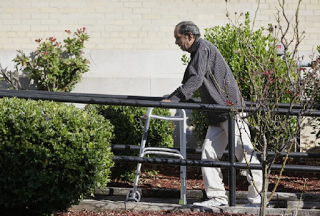
Sureshbhai Patel
(Fifth post in a series)Why did U.S. District Judge Madeline Haikala throw out criminal charges against Alabama police officer Eric Parker in the vicious body slamming of Sureshbhai Patel, a grandfather from India? It certainly is not because Haikala's finding is well grounded in the law; we've shown in multiple posts that it isn't. (See previous posts at the end of this post.)
The law strongly suggests this case should have gone to a third jury after the first two deadlocked, that the key issue was a matter for jurors to decide. But Haikala did not allow that to happen.
Our research suggests Haikala's reasoning might best be summed up this way: Parker had to make a split-second decision about how to handle Patel, and his actions therefore could not meet the willful component required in a criminal civil-rights-case under 18 U.S.C. 242. The government had to show that Parker acted willfully -- that he had a specific intent to deprive Patel of his right to be free from excessive force -- and the split-second nature of the interaction between Parker and Patel makes it impossible for the government to meet that burden.
Here are Judge Haikala's own words on the subject, from page 90 of her 92-page opinion:
The evidence here reveals that Officer Parker made a split-second decision in a rapidly evolving situation rather than a premeditated decision to use violent force. . . . The Court does not mean to suggest that a single, split-second decision can never arise to the level of a constitutional violation so egregious that it supports a finding of intentional conduct. The record in this case simply is not strong enough to eliminate reasonable doubt. For that reason, the Court grants Officer Parker’s renewed motion for judgment of acquittal.
Haikala is being disingenuous here; she actually IS suggesting that an officer almost never can be held criminally accountable, at the federal level, if he acts in a stressful, harried situation. More importantly, Haikala ignores the full legal meaning of the word "willfully" in Section 242 cases.
That's strange because Haikala cites the full meaning of the term, upon which the Patel case largely hinges, on page 53 of her opinion:
“A person acts ‘willfully’ for purposes of section 242 when he acts with ‘a specific intent to deprive a person of a federal right made definite by decision or other rule of law,’ or ‘in open defiance or in reckless disregard of a constitutional requirement which has been made specific and definite.’” United States v. House, 684 F.3d 1173, 1199-1200 (11th Cir. 2012) (quoting Screws v. United States, 325 U.S. 91, 103, 105 (1945)).
As you can see, it's not just a matter of whether Parker acted with "specific intent." It also is a matter of whether he acted with "reckless disregard" of a constitutional requirement.
We invite you to view the video below and ask yourself, "Did Parker act with reckless disregard for Patel's rights when he clearly used a leg swipe to knock the older man's feet out from under him, causing him to land head-first on the ground, becoming partially paralyzed and sustaining injuries that required spinal fusion surgery?"
As Haikala acknowledges on page page 89 of her ruling, "willfulness generally is a question that a jury must resolve, and jurors generally are tasked with the responsibility for assessing the credibility of witnesses." United States v. Feliciano, 761 F.3d 1202, 1206 (11th Cir. 2014).
Multiple expert witnesses testified at trial that Parker's leg swipe is not among the techniques usually taught, or approved for use, in law enforcement. A jury clearly could have found that Parker's use of an improper technique constituted "reckless disregard," even though he acted in a split-second fashion.
So why did Haikala ensure that a third jury would not hear the case, after the first two had deadlocked? The answer to that question remains unclear, but the judge's actions certainly are not supported by law.
(To be continued)
Previously in the series:
(1) Here's the flip side of police-brutality cases -- July 13, 2016
(2) Federal judge in Alabama shows how cops tend to get favorable treatment in court -- July 18, 2016
(3) Judge threw out charges based on case that does not support her findings -- July 29, 2016
(4) Record indicates officer lied about three key issues in Patel brutality case -- August 5, 2016
